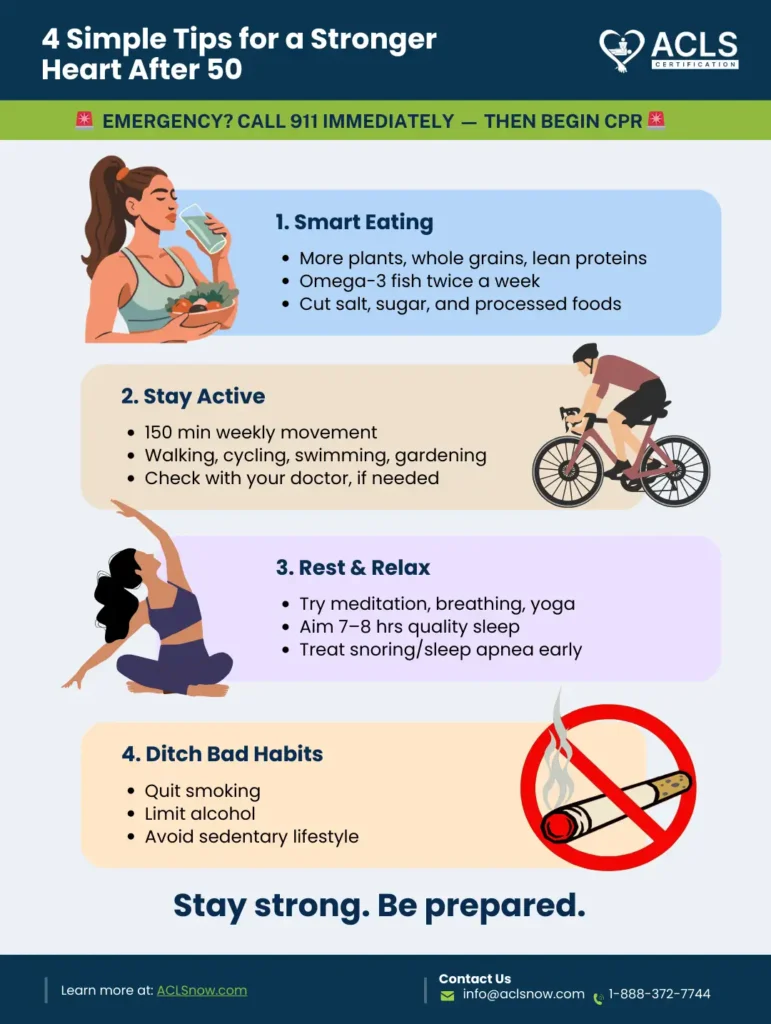You have just celebrated your 50th birthday surrounded by loved ones, a milestone that’s both meaningful and reflective. But while the candles, laughter, and memories mark a moment of joy, they also signal an important turning point in your health, especially your heart. According to the American Heart Association (AHA) reports, over 40% of people have cardiovascular disease between the ages of 40-59.
Aging and heart health go hand in hand. With increasing age, the risk of developing cardiac issues rises sharply. However, aging doesn’t have to mean decline. You can continue to live vibrantly and independently well into your later years with the right knowledge and by making informed lifestyle choices. Let’s learn more about how aging impacts your heart health after you cross 50 years in this guide.
Master ACLS Now
Get ACLS certified with confidence
How Does the Heart Change with Age?
The heart undergoes gradual structural and functional changes as we age, and certain risk factors for cardiovascular disease can start appearing by the time a person reaches 50. These changes influence how effectively our heart performs and how it responds to daily stressors. The most prominent changes are discussed as follows:
Structural and Functional Shifts
Your heart doesn’t beat with the same vigor it did when you began aging. Its walls may thicken, valves may stiffen, and even the number of pacemaker cells that regulate heartbeat naturally decreases, which can result in slower heart rates. It means the heart can no longer pump blood efficiently, especially during physical activity. Sometimes, it also leads to heart blockage in certain individuals.
Impact on Blood Vessels
Aging also affects the arteries. Over time, they lose their elasticity, making it hard for blood to flow smoothly. Sometimes, this reduced flexibility often contributes to increased blood pressure, which is a common issue among older adults. One normal age-related change for the circulatory system is the stiffening of arteries. This, in turn, places added strain on the heart and reduces its ability to adapt during moments of stress or activity.
Read More: Troponin Levels – The Heart Attack Blood Test
Common Heart Issues After 50
The heart becomes more susceptible to chronic conditions after age 50. This requires you to recognize the types of frequent problems and understand the long-term effects of several risk factors. Here is an overview of these common heart issues after 50:
Common Diagnoses in Older Adults
Several heart conditions are frequently diagnosed in individuals over 50. Among the most common are:
- Atrial Fibrillation (AFib):
An irregular, often rapid heartbeat that can lead to blood clots, stroke, and other heart-related complications. Risk increases significantly with age, especially after 65. - Coronary Artery Disease (CAD):
Occurs when plaque builds up in the coronary arteries, reducing blood flow to the heart. It’s the leading cause of heart attacks in older adults. - Heart Failure:
A chronic condition where the heart can’t pump blood efficiently, causing fatigue, shortness of breath, and fluid buildup. Often, the result of long-standing hypertension or prior cardiac damage.
How Risk Factors Accumulate
Years of high cholesterol, high blood pressure, and inflammation take a toll on your heart. These risk factors rarely act alone. Instead, they build up and interact to damage blood vessels and heart muscle silently. By age 50, these hidden risks often begin to surface as more serious cardiovascular conditions.
That’s why routine screening and timely medical attention are almost non-negotiable after midlife; they help catch problems before they become critical.
The Role of Medical Imaging and Diagnosis
Modern technology has improved how we diagnose heart conditions. Imaging techniques and risk assessment tools offer valuable insights into your heart’s health, often before symptoms even appear. Here’s how these innovations make a difference:
What Imaging Can Reveal
Modern diagnostic tools like magnetic resonance imaging (MRI) and CT scans help detect cardiovascular issues early. For example, aging blood on MR imaging may show plaque buildup or narrowed arteries. The best part is that you can know about it even before symptoms surface.
Understanding Your “Heart Age”
In addition to imaging, doctors now use a metric called heart age to estimate the age of your heart based on lifestyle factors and existing health conditions. Often, one’s heart age can be significantly older than their chronological age, acting as a wake-up call to take preventive steps immediately.
Read More: How to Become a Cardiologist?
Heart Disease and the Elderly: A Closer Look
Heart disease remains the leading cause of death among older adults. It’s important to understand how the condition uniquely affects seniors from a medical and emotional standpoint.
Epidemiology and Trends
Heart disease and the elderly are always mentioned together because cardiovascular disease is the leading cause of death in people who are mostly over 65, according to the CDC. Men and women experience different symptoms and progression, which makes personalized care plans essential.
Emotional and Cognitive Effects
Heart disease impacts more than just physical health. Older adults with chronic heart conditions often experience emotional distress, such as anxiety or depression. In some cases, it can also affect cognitive function, contributing to memory loss or confusion. Recognizing these broader impacts is key to a more proper and holistic heart care.
Blood Pressure and Pulse Changes
With age, cardiovascular changes such as elevated blood pressure and irregular heart rhythms become more common. These changes not only raise the risk for stroke and heart attacks but can also strain other organs like the kidneys and brain.
Proactive Steps to Stay Strong After 50
4 Simple Tips for a Stronger Heart After 50
Simple habits. Lasting impact.
Smart Eating
- More plants, whole grains, lean proteins
- Omega-3 fish twice a week
- Swap butter for olive oil, nuts, avocado
- Cut salt, sugar, and processed foods
Stay Active
- 150 min weekly movement
- Walking, cycling, swimming, gardening
- Add light strength + stretching
- Check with your doctor if needed
Rest & Relax
- Stress raises blood pressure
- Try meditation, breathing, yoga
- Aim 7–8 hrs quality sleep
- Treat snoring/sleep apnea early
Ditch Bad Habits
- Quit smoking → heart heals fast
- Limit alcohol → supports rhythm & strength
Design suggestions:
Stay strong. Be prepared.
Learn more at: ACLSnow.com.
Taking early initiative towards caring for your health can yield significant rewards, especially when it comes to your heart health. Multiple aspects of your lifestyle, such as daily habits to emotional wellness, contribute to your cardiovascular condition in the following ways:
Diet and Nutrition
What you eat plays a major role in how your heart ages. Small, consistent changes can reduce inflammation, improve blood pressure, and support long-term heart health. Here’s how to make your meals work for your heart:
- Prioritize plant-based, high-fiber foods: Load your plate with vegetables, fruits, whole grains, legumes, and lean proteins like fish or tofu.
- Include omega-3-rich fish regularly: Aim to eat fatty fish like salmon, sardines, or mackerel at least twice a week for their anti-inflammatory benefits.
- Switch to healthier fats: Use olive oil, nuts, seeds, or avocado instead of saturated fats like butter, ghee, or lard.
- Reduce sodium, sugar, and processed food intake: These drive up blood pressure and inflammation, both of which accelerate heart aging.
- Make simple, lasting swaps: Choose whole-grain bread over white, season with herbs and lemon instead of salt, and opt for roasted over fried foods.
.
Physical Activity
You don’t need a gym membership to take care of your heart. Simple, consistent movement makes a big difference.
- Move at least 150 minutes a week: Spread out moderate aerobic activity, like brisk walking or dancing, over several days.
- Pick what feels good on your joints: Low-impact options like swimming, cycling, or even gardening work well.
- Add variety for full-body benefits: Light strength training and stretching support mobility, balance, and bone strength.
- Talk to your doctor before starting: Especially important if you have existing heart conditions or haven’t been active in a while.
Stress and Sleep Management
Poor stress management and inadequate sleep are often overlooked but can significantly increase the risk of heart disease. Here are simple, evidence-based ways to protect your heart through better daily habits:
- Chronic stress can raise blood pressure: Long-term stress activates the sympathetic nervous system, which can lead to sustained high blood pressure and increased risk of heart disease.
- Practice daily relaxation techniques: Incorporate methods like meditation, deep breathing exercises, or yoga to calm your nervous system and lower cortisol levels.
- Aim for 7–8 hours of quality sleep per night: Consistent, restful sleep helps regulate blood pressure and supports overall cardiovascular function.
- Treat sleep disorders early: Conditions like sleep apnea are strongly linked to high blood pressure, arrhythmias, and heart failure. If you snore loudly or feel excessively tired during the day, seek medical evaluation.
Avoiding Harmful Habits
Lifestyle choices have a direct impact on cardiovascular health. Two of the most immediate and powerful changes you can make are quitting smoking and cutting back on alcohol:
- Quit Smoking: Tobacco use damages the lining of your arteries, raises blood pressure, lowers oxygen levels, and significantly increases the risk of heart disease, stroke, and peripheral artery disease.
- Limit Alcohol Consumption: Excessive drinking can raise blood pressure, weaken the heart muscle (alcoholic cardiomyopathy), and trigger irregular heart rhythms like atrial fibrillation.
- Why These Changes Matter: According to the CDC, quitting smoking lowers the risk of coronary heart disease. The risk drops a lot within 1–2 years and keeps going down gradually over time. Reducing alcohol intake also improves heart function and lowers inflammation levels in the body.
Treatment and Preventive Strategies for Aging People
Managing heart health after 50 is all about preventing heart issues before they even start. This includes medication, routine screenings, and support from your personal network. Here’s an overview of these treatments and preventive strategies:
Medications and Therapies
Medicines like statins, beta-blockers, or Angiotensin-Converting Enzyme inhibitors (ACE) are a must for heart conditions. Healthcare providers usually prescribe these drugs to manage cholesterol, control blood pressure, and reduce overall risk. Adherence to prescribed medication and techniques like cardiac massage is also mandatory for better effectiveness.
Importance of Regular Monitoring
Once you’re in your 50s, regular monitoring of blood pressure, cholesterol, and blood sugar becomes non-negotiable. Consistent checkups help detect early changes and allow for timely medical or lifestyle interventions.
In addition to basic vitals, preventive screenings, such as ECGs, stress tests, and comprehensive blood panels, can uncover hidden risks before symptoms appear. Early detection significantly improves outcomes and helps manage or even reverse potential heart conditions.
Role of Support Systems
Long-term heart health also depends on family involvement and community support. Anyone interested can easily join a support group or have a workout buddy who can improve consistency and motivation.
Get Certified to Learn More About Heart Health
Aging and heart health are deeply interconnected. While aging does bring inevitable changes, it does not have to lead to inevitable decline. You can protect your cardiovascular system well through your golden years by understanding how the heart transforms with age and taking proactive steps.
Every action counts, so take charge of your health, understand how the heart changes with age, from shifts in blood pressure to the appearance of aging blood on MRI scans… While heart disease becomes more common later in life, it’s not an unavoidable fate. One way to deepen your understanding is by enrolling in an advanced cardiac life support (ACLS) certification course covering critical care, emergency response, and advanced cardiac protocols.








